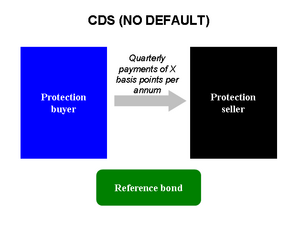
Back مقايضة الائتمان الافتراضي Arabic Kreditin defolt svopu Azerbaijani Credit default swap Czech Credit Default Swap German Συμβάσεις ανταλλαγής κινδύνου αθέτησης Greek Permuta de incumplimiento crediticio Spanish Credit default swap Basque تبادل افول اعتبار Persian Credit default swap Finnish Credit default swap French


A credit default swap (CDS) is a financial swap agreement that the seller of the CDS will compensate the buyer in the event of a debt default (by the debtor) or other credit event.[1] That is, the seller of the CDS insures the buyer against some reference asset defaulting. The buyer of the CDS makes a series of payments (the CDS "fee" or "spread") to the seller and, in exchange, may expect to receive a payoff if the asset defaults.
In the event of default, the buyer of the credit default swap receives compensation (usually the face value of the loan), and the seller of the CDS takes possession of the defaulted loan or its market value in cash. However, anyone can purchase a CDS, even buyers who do not hold the loan instrument and who have no direct insurable interest in the loan (these are called "naked" CDSs). If there are more CDS contracts outstanding than bonds in existence, a protocol exists to hold a credit event auction. The payment received is often substantially less than the face value of the loan.[2]
- ^ Azad, C (April 10, 2013). "CDOs Are Back: Will They Lead to Another Financial Crisis". University of Pennsylvania. Wharton. Retrieved January 31, 2018.
- ^ Pollack, Lisa (January 5, 2012). "Credit event auctions: Why do they exist?". FT Alphaville. Retrieved January 5, 2012.
© MMXXIII Rich X Search. We shall prevail. All rights reserved. Rich X Search